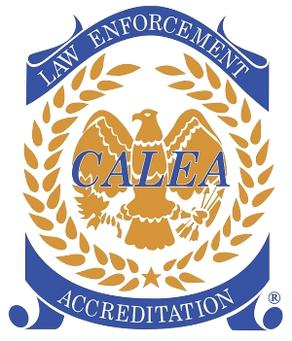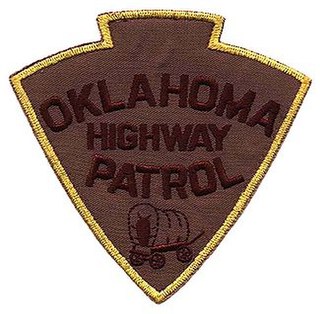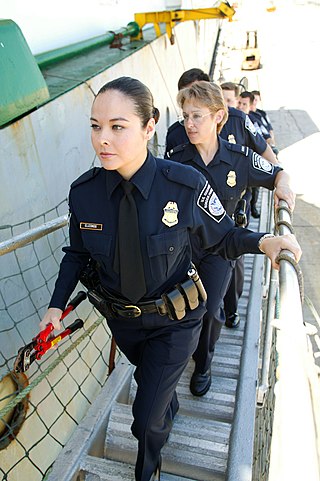
The Federal Law Enforcement Training Centers serves as an interagency law enforcement training body for 105 United States government federal law enforcement agencies. The stated mission of FLETC is to "...train those who protect our homeland". Through the Rural Policing Institute (RPI) and the Office of State and Local Training, it provides tuition-free and low-cost training to state, local, campus and tribal law enforcement agencies.

A police academy, also known as a law enforcement training center, police college, or police university, is a training school for police cadets, designed to prepare them for the law enforcement agency they will be joining upon graduation, or to otherwise certify an individual as a law enforcement officer, typically a police officer.

The West Virginia State Police (WVSP) is a state law enforcement agency in the United States that provides police services to the residents of West Virginia. It is the fourth-oldest state police agency in the US. The WVSP was disbanded due to their involvement in quelling of the uprisings on behalf of the coal and mine companies which were surrounding the concept of organized labor in the coal and mine industries. The WVSP was then reorganized as the Department of Public Safety in the second extraordinary session of the West Virginia Legislature on June 19, 1919, as a result of their involvement.

The Commission on Accreditation for Law Enforcement Agencies, Inc. (CALEA) is a credentialing authority (accreditation), based in the United States, whose primary mission is to accredit public safety agencies, namely law enforcement agencies, training academies, communications centers, and campus public safety agencies.

The Washington State Patrol (WSP) is the state patrol agency for the U.S. state of Washington. Organized as the Washington State Highway Patrol in 1921, it was renamed and reconstituted in 1933. The agency is charged with the protection of the Governor of Washington and the grounds of the Washington State Capitol; security aboard the vessels and terminals of the Washington State Ferries; law enforcement on interstate and state highways in Washington; and providing specialized support to local law enforcement including laboratory forensic services, mobile field forces during periods of civil unrest or disaster, and tactical teams. The State Fire Marshal's Office, responsible for operation of the Washington State Fire Training Academy and for certain aspects of civil defense mobilization, is a component office of the Washington State Patrol, and the State Patrol is the managing agency of the Washington Fusion Center, which coordinates anti-terrorist and anti-organized crime activities within Washington.

The Colorado Rangers Law Enforcement Shared Reserve (CLER), known publicly as the Colorado Rangers, is a statewide police agency in the U.S. state of Colorado. It is a statewide law enforcement reserve of sworn POST-certified peace officers who serve as force multipliers, allowing Colorado law enforcement agencies to reduce costs and manpower through a shared force. It is the only such statewide police reserve force in the United States. The Colorado Rangers have existed in some capacity since Colorado Territory's formation in 1861, though the modern agency was formed in 2017 from the Colorado Mounted Rangers.

The Oklahoma Highway Patrol (OHP) is a major state law enforcement agency of the government of Oklahoma. A division of the Oklahoma Department of Public Safety, the OHP has traffic enforcement jurisdiction throughout the state. OHP was legislatively created on July 1, 1937, due to the growing problem of motor vehicle collisions, the expansion of highway systems, and the increase in criminal activities.

The Oklahoma State Bureau of Investigation (OSBI) is an independent state law enforcement agency of the government of Oklahoma. The OSBI assists the county sheriff offices and city police departments of the state, and is the primary investigative agency of the state government. OSBI works independent of the Oklahoma Department of Public Safety to investigate criminal law violations within the state at the request of statutory authorized requesters. The OSBI was created in 1925 during the term of Governor Martin E. Trapp.

A conservation officer is a law enforcement officer who protects wildlife and the environment. A conservation officer may also be referred to as an environmental technician/technologist, game warden, park ranger, forest watcher, forest guard, forester, gamekeeper, investigator, wildernessofficer, wildlifeofficer, or wildlife trooper.

The New Jersey State Parole Board is a governmental body in the U.S. State of New Jersey that is responsible for assisting offenders to reenter society as law-abiding residents. To improve the safety of the public and the quality of life in New Jersey by administering an innovative parole system that addresses the needs of the community, victims, and offenders through a responsible decision-making process that provides every available opportunity for successful offender reintegration.

The Maryland Natural Resources Police (NRP) is the law enforcement arm of the Maryland Department of Natural Resources (DNR), tasked with enforcing laws on the state's public lands and waterways, protecting fish and wildlife, and leading search and rescue efforts. The Natural Resources Police is also the state's maritime homeland security agency.

National Park Service rangers are among the uniformed employees charged with protecting and preserving areas set aside in the National Park System by the United States Congress and the President of the United States. While all employees of the agency contribute to the National Park Service mission of preserving unimpaired the natural and cultural resources set aside by the American people for future generations, the term "park ranger" is traditionally used to describe all National Park Service employees who wear the uniform. Broadly speaking, all National Park Service rangers promote stewardship of the resources in their care—either voluntary stewardship via resource interpretation, or compliance with statute or regulation through law enforcement. These comprise the two main disciplines of the ranger profession in the National Park Service.

The Frederick County Sheriff's Office (FCSO) is the primary law enforcement agency serving a population of 222,938 residents within the 662.88 square miles (1,717 km2) area of Frederick County, Maryland.

The federal government of the United States empowers a wide range of federal law enforcement agencies to maintain law and public order related to matters affecting the country as a whole.

United States Department of Defense police are the uniformed civilian security police officers of the United States Department of Defense (DoD), various branches of the United States Armed Forces, or DoD agencies.

The Office of Enforcement and Compliance Assurance (OECA) is the law enforcement arm of the United States Environmental Protection Agency (EPA). It is made up of attorneys, special agents, scientists and other employees.

The Bureau of Indian Affairs Police, Office of Justice Services, also known as BIA Police, is the law enforcement arm of the United States Bureau of Indian Affairs. The BIA's official mission is to "uphold the constitutional sovereignty of the Federally recognized Tribes and preserve peace within Indian country". It provides police, investigative, corrections, technical assistance, and court services across the over 567 registered Indian tribes and reservations, especially those lacking their own police force; additionally, it oversees tribal police organizations. BIA services are provided through the Office of Justice Services Division of Law Enforcement.
In the United States, certification and licensure requirements for law enforcement officers vary significantly from state to state. Policing in the United States is highly fragmented, and there are no national minimum standards for licensing police officers in the U.S. Researchers say police are given far more training on use of firearms than on de-escalating provocative situations. On average, US officers spend around 21 weeks training before they are qualified to go on patrol, which is far less than in most other developed countries.

California State Park Peace Officers (S.P.P.O.) are fully sworn California State Police Officers, with two sub-classifications, the Ranger and the Lifeguard. S.P.P.O.s often use the title of State Police Officer during enforcement contact, as many Park Rangers and Lifeguards within municipalities, counties and special districts are armed Peace Officers, with authority throughout the state, on and off duty, like the California State Park Peace Officers law enforcement officer. State Park Peace Officers perform a wide variety of general law-enforcement activities, including complex criminal investigations, traffic enforcement, and participate in statewide task forces, for gang suspension, narcotics enforcement, auto theft, and fish and wildlife crimes, under the jurisdiction of the California State Parks. Duties include general law enforcement, aquatic rescue, search and rescue, emergency medical response, interpretation of natural, historic and cultural resources, resource protection, park management and proactive enforcement patrol. The current sidearm of the California State Park Peace Officer is the Smith & Wesson M&P, the current patrol rifle is the Colt AR-15 Model LE6920, and the current patrol shotgun is the Remington Model 870 Police Magnum.

National Park Service Law Enforcement Rangers are uniformed federal law enforcement officers with broad authority to enforce federal and state laws within National Park Service (NPS) sites. The National Park Service commonly refers to law enforcement operations in the agency as Visitor and Resource Protection. In units of the National Park System, law enforcement rangers are the primary police agency. The National Park Service also employs special agents who conduct more complex criminal investigations. Rangers and agents receive extensive police training at the Federal Law Enforcement Training Centers and annual in-service and regular firearms training.


















